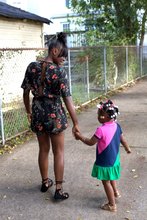0
Communications
Community:
Apr 9, 2025
Every infant and toddler deserves a safe, stable, and nurturing start in life. That’s why Housing Is has joined forces with Prevent Child Abuse America, SchoolHouse Connection, and ZERO TO THREE to launch Thrive From The Start—a cross-sector effort dedicated to addressing homelessness among infants, toddlers, and expectant parents. Visit thrivefromthestart.org to learn more and explore how you can be a part of the solution.
Authored by:
Topics: Early childhood, Health, Homelessness, Housing, Pre-natal
 Shared by Housing Is
Shared by Housing Is
Housing Is posted a
on Apr 9, 2025
Every infant and toddler deserves a safe, stable, and nurturing start in life.
0
Publication
Community:
Jan 18, 2024
Marjorie Sims, Sarah Haight
January 2024
Focused on the 23,306 young parents (ages 18 to 24) and their families in New Mexico, this report provides a framework for organizations in New Mexico to collaborate more effectively and offers a plan of action to assess these efforts and strengthen impact for families.
This publication aims to deepen understanding about the demographics, aspirations, and needs of young parents; highlights practices and policies aligned with a two-generation (2Gen) approach; showcases opportunities to streamline this work by forging connections between organizations and state systems; and offers recommendations across sectors and at all levels.
Suggested Reference: Suggested Reference: Sims, M. & Haight, S. (2024). Meeting Young Parents Where They Dream: A Collaborative Framework for a 2Gen Approach in New Mexico. Washington, DC.
Authored by: Marjorie Sims, Sarah Haight
Topics: Child welfare, Dual-generation, dual-generation initiative, Early childhood, Family engagement, Healthy homes, Housing
 Shared by Molli Caite Hughes
Shared by Molli Caite Hughes
Molli Caite Hughes posted a
on Jan 18, 2024
Marjorie Sims, Sarah Haight
Marjorie Sims, Sarah Haight
January 2024
Focused on the 23,306 young parents (ages 18 to 24) and their families in New Mexico, this report provides a framework for organizations in New Mexico to collaborate more effectively and offers a plan of action to assess these efforts and strengthen impact
0
Video
Community:
Jun 17, 2022
This panel discussion will examine the results of efforts to significantly expand the reach of HUD’s Family Self-Sufficiency Program through partnerships between the nonprofit Compass Working Capital and the Boston and Cambridge Housing Authorities. Panelists will discuss their program model and its evaluation, how they have scaled up FSS, what results they have experienced to date, and where they plan to go from here. An FSS program participant will participate in the panel and share their perspective on how the program has benefitted them.
Authored by:
Topics: Advocacy, Asset building, CLPHA, Early childhood, Education, Housing, Legislation & Policy, Research, Supportive housing
 Shared by Karina George
Shared by Karina George
Karina George posted a
on Jun 17, 2022
This panel discussion will examine the results of efforts to significantly expand the reach of HUD’s Family Self-Sufficiency Program through partnerships between the nonprofit Compass Working Capital and the Boston and Cambridge Housing Authorities.
0
Video
Community:
Jun 17, 2022
Public and affordable housing agencies and organizations have the potential to serve as a crucial foundation for promoting early school success for economically challenged, fragile and otherwise marginalized children and families through a 24/7/365 multigenerational system of support and an ability to meet families 'where they are.' During this engaging session, Housing Is and our long-time partner The Campaign for Grade-Level Reading will elevate the critical importance of these housing-education partnerships, with special attention to the way in which such collaborations begin. This plenary will explore initial partnership development work taking place in Kansas City, MO, one of the 20 finalist communities recently announced for the 2022 All-America City Awards. The theme of this year's award is "Housing as a Platform to Promote Early School Success and Equitable Learning Recovery." Attendees have the unique opportunity to hear from a partnership in its earlier stages of development and learn alongside the speakers how critical cross-sector work can be launched.
Authored by:
Topics: Advocacy, CLPHA, Early childhood, Education, Healthy homes, Housing, Low-income, Supportive housing, Sustainability
 Shared by Karina George
Shared by Karina George
Karina George posted a
on Jun 17, 2022
Public and affordable housing agencies and organizations have the potential to serve as a crucial foundation for promoting early school success for economically challenged, fragile and otherwise marginalized children and families through a 24/7/365 multigenerational system of support and an ability
0
Publication
Community:
Jun 17, 2021
Authored by: U.S. Department of Housing and Urban Development Choice Neighborhoods
Topics: Attendance, COVID-19, Early childhood, Education, Family engagement, Housing, Low-income, Out-of-school time, Youth
 Shared by Kirsten Greenwell
Shared by Kirsten Greenwell
Kirsten Greenwell posted a
on Jun 17, 2021
U.S. Department of Housing and Urban Development Choice Neighborhoods
0
Policy Brief
Community:
Dec 4, 2019

In California, more than 3.7 million students were eligible for free or reduced priced school meals in the 2017-2018 school year. For many of those students, school meals are the primary source of regular access to healthy food. When the bell rings at 3:00 or lets out for summer break, many of those students go home to nutritional uncertainty or high-calorie, low-nutrient foods.
For many low-income families, the out-of-school-time food access gap increases family stress: limited budgets are stretched further to cover food, rent, utilities, transportation, medications, and chidcare costs. For very young children, food insecurity can negatively impact brain and physical development. For children of all ages, disrupted access to healthy food can impact behavior, increase risk of obesity, make it harder to concentrate, or exacerbate existing healthy conditions like type 2 diabetes. The impact is not limited to summer, and can lead to a rocky start to the school year, negatively impacting school attendance and students’ ability to effectively participate in school.
Read the full brief to learn how public and affordable housing communities can address food insecurity for children and youth with the help of out-of-school-time USDA child nutrition programs.
Authored by:
Topics: Advocacy, Early childhood, Food insecurity, Health, Healthy homes, Housing, Legislation & Policy, Low-income, Nutrition, Out-of-school time, West Coast, Youth
 Shared by Linda Lu
Shared by Linda Lu
Linda Lu posted a
on Dec 4, 2019
In California, more than 3.7 million students were eligible for free or reduced priced school meals in the 2017-2018 school year. For many of those students, school meals are the primary source of regular access to healthy food.
0
Report
Community:
Nov 7, 2019
How Housing Programs Can Support the Educational Needs of Children Living in Publicly Supported Homes
Authored by: Public and Affordable Housing Research Corporation
Topics: Attendance, Broadband, Child welfare, Early childhood, Health, Housing, Literacy, Low-income, Out-of-school time, Partnerships, Place-based, Research, School-readiness
 Shared by Kelly McElwain
Shared by Kelly McElwain
Kelly McElwain posted a
on Nov 7, 2019
Public and Affordable Housing Research Corporation
How Housing Programs Can Support the Educational Needs of Children Living in Publicly Supported Homes
0
News Article
Community:
Recognizing that the aging of its population will reshape housing needs, the city of Washington, DC, has fostered numerous options for older residents, including some that are intentionally multigenerational.
Authored by: PD&R Edge Online Magazine
Topics: Early childhood, Family engagement, Housing, Low-income, Seniors, Youth
 Shared by Housing Is
Shared by Housing Is
Housing Is posted a
on Jun 11, 2019
PD&R Edge Online Magazine
Recognizing that the aging of its population will reshape housing needs, the city of Washington, DC, has fostered numerous options for older residents, including some that are intentionally multigenerational.
0
Research
Community:
Jun 5, 2019
A new report by Chapin Hall at the University of Chicago finds that youth homelessness has its origins in early family experiences, including family homelessness. The findings make painfully clear that housing alone is insufficient to prevent and “end” youth homelessness, and that addressing youth homelessness alone, without explicit connections and fervent attention to family homelessness, will result in continued homelessness for all populations.
Authored by: SchoolHouse Connection
Topics: Early childhood, Homelessness, Housing, Legislation & Policy
 Shared by Housing Is
Shared by Housing Is
Housing Is posted a
on Jun 5, 2019
A new report by Chapin Hall at the University of Chicago finds that youth homelessness has its origins in early family experiences, including family homelessness.
0
Publication
Community:
May 24, 2019
There’s a growing body of evidence that positively links affordable, stable, and quality housing with improved educational outcomes for children. That research continually points to the positive return on investment for the earliest possible intervention. Housing authorities are uniquely poised to help change the trajectory for low-income children who typically arrive in kindergarten already substantially behind their peers. We can leverage unique assets that other systems players cannot.
Authored by: Betsey Martens and Erica Plut for Journal of Housing and Community Development
Topics: Early childhood, Education, Housing, Out-of-school time, Partnerships
 Shared by Housing Is
Shared by Housing Is
Housing Is posted a
on May 28, 2019
Betsey Martens and Erica Plut for Journal of Housing and Community Development
There’s a growing body of evidence that positively links affordable, stable, and quality housing with improved educational outcomes for children. That research continually points to the positive return on investment for the earliest possible intervention.
0
Report
Community:
May 1, 2019
Child poverty is an urgent and preventable crisis. Solutions to child poverty already exist if we just expand and invest in them. Benefits like nutrition assistance, housing vouchers and tax credits helped lift nearly 7 million children out of poverty in 2017, but millions of children were left behind due to inadequate funding, eligibility restrictions and low wages. We can and must fix these problems to help more children escape poverty now.
Authored by: Children's Defense Fund
Topics: Child welfare, Dual-generation, Early childhood, Food insecurity, Funding, Housing, Legislation & Policy, Low-income, Research, Workforce development
 Shared by Housing Is
Shared by Housing Is
Housing Is posted a
on May 28, 2019
Child poverty is an urgent and preventable crisis. Solutions to child poverty already exist if we just expand and invest in them.
0
Video
Community:
May 9, 2019
On May 9, the Brookings Institution hosted an event to discuss the subsequent report, “A Roadmap to Reducing Child Poverty.” The event featured comments from Greg Duncan, who served as Chair of the Committee on Building an Agenda to Reduce the Number of Children in Poverty by Half in 10 Years, as well as a panel discussion on the report, its recommendations, and barriers to implementation. A second panel highlighted national and state policy perspectives of the consensus study report.
Authored by: The Brookings Institution
Topics: Early childhood, Funding, Housing, Legislation & Policy, Low-income, Research, Youth
 Shared by Housing Is
Shared by Housing Is
Housing Is posted a
on May 13, 2019
The Brookings Institution
On May 9, the Brookings Institution hosted an event to discuss the subsequent report, “A Roadmap to Reducing Child Poverty.” The event featured comments from Greg Duncan, who served as Chair of the Committee on Building an Agenda to Reduce the Number of Children in Poverty by Half in 10 Years, as we
0
Publication
Community:
Moving Health Care Upstream (MHCU) is based on the belief that health systems can address persistent and costly health inequities by moving “upstream”—beyond the walls of hospitals and clinics and into the communities, collaborating with community-based organizations to address the root causes of disease. The various areas of work within MHCU share a common focus-supporting hospitals and community stakeholders in testing and spreading strategies to move upstream, and sharing “what works” to inform the field and accelerate the upstream movement in the field as a whole. Policy Learning Labs are one example of MHCU’s work to spread knowledge and accelerate action in the field.
Authored by: Nemours, Moving Health Care Upstream, and Change Lab Solutions
Topics: Child welfare, Early childhood, Food insecurity, Green, Health, Housing, Legislation & Policy, Nutrition, Partnerships, Youth
 Shared by Housing Is
Shared by Housing Is
Housing Is posted a
on May 1, 2019
Nemours, Moving Health Care Upstream, and Change Lab Solutions
Moving Health Care Upstream (MHCU) is based on the belief that health systems can address persistent and costly health inequities by moving “upstream”—beyond the walls of hospitals and clinics and into the communities, collaborating with community-based organizations to address the root causes of di
0
Publication
Community:
Founded in 1995 as Project Women, Family Scholar House (FSH) provides comprehensive, holistic services for disadvantaged single parents, their children, and foster alumni. The nonprofit seeks to end the cycle of poverty and transform communities by empowering families and youth to succeed in education and life-long self-sufficiency. FSH provides supportive housing, educational programming, and participant advocacy to help families gain independence.
Authored by: American Planning Association
Topics: Dual-generation, Early childhood, Education, Homelessness, Housing, Low-income, Partnerships, Place-based, Post-secondary, South, Stability
 Shared by Mica O'Brien
Shared by Mica O'Brien
Mica O'Brien posted a
on Apr 18, 2019
American Planning Association
Founded in 1995 as Project Women, Family Scholar House (FSH) provides comprehensive, holistic services for disadvantaged single parents, their children, and foster alumni.
0
Publication
Community:
Houston children continue to be poisoned by lead even though childhood lead poisoning is considered the most preventable environmental disease among young children. In the past three years, almost 1,200 Houston children between 0 and 72 months old were found to have lead in their blood above the reference value of concern set by Centers for Disease Control and Prevention. The Houston Health Department (HHD) has hosted the Lead-Based Paint Hazard Control Program (LBPHCP) for over 25 years, with the goal of providing a lead-safe home environment through home investigations and home lead abatement.
Authored by: Komal Sheth for All In: Data for Community Health
Topics: Early childhood, Health, Housing, Lead, Partnerships, Safety
 Shared by Housing Is
Shared by Housing Is
Housing Is posted a
on Apr 8, 2019
Komal Sheth for All In: Data for Community Health
Houston children continue to be poisoned by lead even though childhood lead poisoning is considered the most preventable environmental disease among young children.
0
Policy Brief
Community:
The Homeless Children and Youth Act of 2019 (H.R. 2001) is a bipartisan bill that removes barriers to U.S. Department of Housing and Urban Development (HUD) homelessness assistance for children, youth and families in the following ways.
Authored by:
Topics: Early childhood, Homelessness, Housing, Legislation & Policy, Youth
 Shared by Housing Is
Shared by Housing Is
Housing Is posted a
on Apr 4, 2019
The Homeless Children and Youth Act of 2019 (H.R. 2001) is a bipartisan bill that removes barriers to U.S. Department of Housing and Urban Development (HUD) homelessness assistance for children, youth and families in the following ways.
0
Publication
Community:
Mar 1, 2019
Released bi-monthly, each issue of the ZERO TO THREE Journal focuses on a critical topic within the early childhood development field. Journal articles are carefully composed to present current knowledge, latest research, and practical advice to help early childhood professionals do their best work in support of infants and toddlers.
Authored by: Zero To Three
Topics: Child welfare, Dual-generation, Early childhood, Homelessness, Housing, Low-income, Research, Safety
 Shared by Mica O'Brien
Shared by Mica O'Brien
Mica O'Brien posted a
on Mar 26, 2019
Released bi-monthly, each issue of the ZERO TO THREE Journal focuses on a critical topic within the early childhood development field.
0
Research
Community:
Jan 1, 2019
Homelessness during pregnancy poses significant health risks for mothers and infants. As health care providers increase their emphasis on social determinants of health, it is important to understand how unstable housing contributes to complications during pregnancy. We linked data about emergency shelter enrollees with Massachusetts Medicaid claims for the period January 1, 2008–June 30, 2015 to compare health care use and pregnancy complications for 9,124 women who used emergency shelter with those for 8,757 similar women who did not. Rates of mental illness and substance use disorders were significantly higher among homeless women. Adjusted odds of having nine pregnancy complications were also significantly higher for homeless women and remained substantially unchanged after we adjusted for behavioral health disorders.
Authored by: Robin Clark, Linda Weinreb, Julie Flahive, and Robert Seifert for Health Affairs
Topics: Child welfare, Depression, Early childhood, Homelessness, Housing, Low-income, Mental health, Pre-natal, Research, Substance abuse
 Shared by Housing Is
Shared by Housing Is
Housing Is posted a
on Mar 26, 2019
Robin Clark, Linda Weinreb, Julie Flahive, and Robert Seifert for Health Affairs
Homelessness during pregnancy poses significant health risks for mothers and infants. As health care providers increase their emphasis on social determinants of health, it is important to understand how unstable housing contributes to complications during pregnancy.
0
Publication
Community:
Jan 31, 2019
For many years, the vulnerabilities of children experiencing homelessness have been glossed over on the assumption that their innate resilience would overcome the impact of homelessness. As someone who worked in the field, I would often hear, “Oh, they’ll never remember.” Today we know better. We know more about how the brain develops and about how trauma impacts brain development. There is a growing recognition among providers that these early years are critical for establishing a foundation for emotional, mental, and physical wellbeing, and that we don’t get a second chance at early childhood.
Authored by: Carol Klocek for SchoolHouse Connection
Topics: Early childhood, Education, Homelessness, Housing, Low-income, Research, Safety, Stability
 Shared by Housing Is
Shared by Housing Is
Housing Is posted a
on Feb 21, 2019
Carol Klocek for SchoolHouse Connection
For many years, the vulnerabilities of children experiencing homelessness have been glossed over on the assumption that their innate resilience would overcome the impact of homelessness. As someone who worked in the field, I would often hear, “Oh, they’ll never remember.” Today we know better.
0
Research
Community:
Mar 14, 2017
This brief examines the well-being of young children 20 months after staying in emergency homeless shelters with their families.
Authored by: Office of the Administration for Children & Families, U.S. Department of Health and Human Services
Topics: Early childhood, Homelessness, Housing, Literacy, Low-income, Research, School-readiness
 Shared by Mica O'Brien
Shared by Mica O'Brien
Mica O'Brien posted a
on Jan 29, 2019
Office of the Administration for Children & Families, U.S. Department of Health and Human Services
This brief examines the well-being of young children 20 months after staying in emergency homeless shelters with their families.
0
Publication
Community:
Teachers know that children learn better and are more likely to graduate when they live in a stable, affordable home.
Authored by: Opportunity Starts at Home
Topics: Child welfare, Early childhood, Education, Housing, Partnerships, Youth
 Shared by Mica O'Brien
Shared by Mica O'Brien
Mica O'Brien posted a
on Jan 18, 2019
Opportunity Starts at Home
Teachers know that children learn better and are more likely to graduate when they live in a stable, affordable home.
0
Publication
Community:
Jan 1, 2019
According to the Institute for Women’s Policy Research, 26% of undergraduate students--about 4.8 million students--are raising dependent children. Students of color are more likely to be parents; additionally, about 70% of parenting students are women. These students are balancing many competing demands: attending classes, keeping up with schoolwork, and caring for children. College and child care are costly, with the average cost of child care ranging between $8,000-$35,000 each year. As a result, parenting students are more likely to experience food and housing insecurity than students who do not have children.
Authored by: SchoolHouse Connection
Topics: Dual-generation, Early childhood, Education, Housing, Partnerships, Post-secondary, Youth
 Shared by Mica O'Brien
Shared by Mica O'Brien
Mica O'Brien posted a
on Jan 16, 2019
According to the Institute for Women’s Policy Research, 26% of undergraduate students--about 4.8 million students--are raising dependent children. Students of color are more likely to be parents; additionally, about 70% of parenting students are women.
0
Publication
Community:
Oct 9, 2018
Women with children, especially, stay hidden in fear of losing custody of their children. As a result, we will never see them camping in tents or in downtown parks.
Authored by: Mary Ellen Mitchell for SchoolHouse Connection
Topics: Early childhood, Homelessness, Housing, Legislation & Policy, Low-income, Safety, Stability
 Shared by Mica O'Brien
Shared by Mica O'Brien
Mica O'Brien posted a
on Jan 11, 2019
Mary Ellen Mitchell for SchoolHouse Connection
Women with children, especially, stay hidden in fear of losing custody of their children. As a result, we will never see them camping in tents or in downtown parks.
0
Report
Community:
Dec 1, 2018
This 2018 report updates the annual Early Childhood Homelessness State Profiles and provides a snapshot of early childhood data available for children who are experiencing homelessness in each state, plus the District of Columbia and Puerto Rico. It includes publicly available data for 2015—2016 from the U.S. Census Bureau (Census), U.S. Department of Education (ED), U.S. Department of Housing and Urban Development (HUD), U.S. Department of Health and Human Services (HHS), and the Annie E. Casey Foundation.
Authored by: U.S. Department of Education
Topics: Early childhood, Homelessness, Housing, Low-income, Research
 Shared by Mica O'Brien
Shared by Mica O'Brien
Mica O'Brien posted a
on Jan 8, 2019
U.S. Department of Education
This 2018 report updates the annual Early Childhood Homelessness State Profiles and provides a snapshot of early childhood data available for children who are experiencing homelessness in each state, plus the District of Columbia and Puerto Rico.
0
Publication
Community:
Jan 2, 2019
Housing quality, instability, and unaffordability threaten the well-being of millions of children across the nation. Research shows that housing is the first rung on the ladder to economic opportunity and that a person’s access to opportunity is intrinsically linked with that of the community where they live. As home prices increase, the gap between rents and incomes continues to widen, and nearly half of today’s renters are cost burdened. Child welfare professionals, educators, and pediatricians can strengthen their work by understanding the central importance of housing as a determinant of wide-ranging outcomes for the country’s youngest generation.
Authored by: Veronica Gaitan for How Housing Matters
Topics: Child welfare, Early childhood, Health, Housing, Research, Safety
 Shared by Mica O'Brien
Shared by Mica O'Brien
Mica O'Brien posted a
on Jan 7, 2019
Veronica Gaitan for How Housing Matters
Housing quality, instability, and unaffordability threaten the well-being of millions of children across the nation.
 Shared by Housing Is
on Apr 9, 2025
Shared by Housing Is
on Apr 9, 2025
 Shared by Molli Caite Hughes
on Jan 18, 2024
Shared by Molli Caite Hughes
on Jan 18, 2024
 Shared by Karina George
on Jun 17, 2022
Shared by Karina George
on Jun 17, 2022
 Shared by Karina George
on Jun 17, 2022
Shared by Karina George
on Jun 17, 2022
 Shared by Kirsten Greenwell
on Jun 17, 2021
Shared by Kirsten Greenwell
on Jun 17, 2021

 Shared by Linda Lu
on Dec 4, 2019
Shared by Linda Lu
on Dec 4, 2019

 Shared by Kelly McElwain
on Nov 7, 2019
Shared by Kelly McElwain
on Nov 7, 2019

 Shared by Housing Is
on Jun 11, 2019
Shared by Housing Is
on Jun 11, 2019


 Shared by Housing Is
on Jun 5, 2019
Shared by Housing Is
on Jun 5, 2019

 Shared by Housing Is
on May 28, 2019
Shared by Housing Is
on May 28, 2019
 Shared by Housing Is
on May 28, 2019
Shared by Housing Is
on May 28, 2019
 Shared by Housing Is
on May 13, 2019
Shared by Housing Is
on May 13, 2019
 Shared by Housing Is
on May 1, 2019
Shared by Housing Is
on May 1, 2019



 Shared by Housing Is
on Apr 8, 2019
Shared by Housing Is
on Apr 8, 2019

 Shared by Housing Is
on Apr 4, 2019
Shared by Housing Is
on Apr 4, 2019
 Shared by Housing Is
on Mar 26, 2019
Shared by Housing Is
on Mar 26, 2019

 Shared by Housing Is
on Feb 21, 2019
Shared by Housing Is
on Feb 21, 2019







